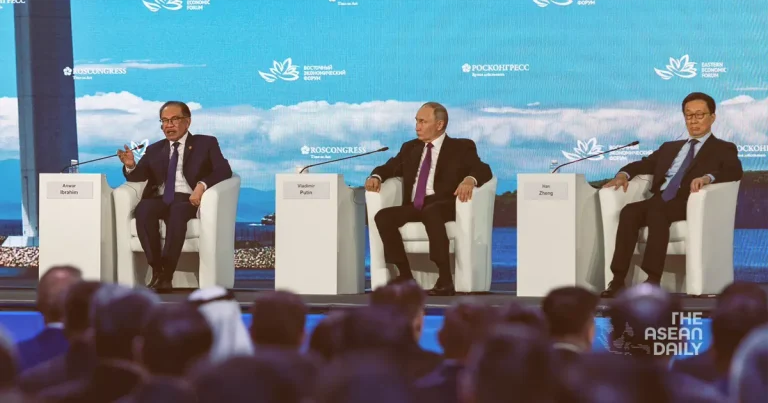6-9-2024 (VLADIVOSTOK) Malaysian Prime Minister Anwar Ibrahim’s recent visit to Russia has sent ripples through the geopolitical landscape, signalling a potential shift in Southeast Asian diplomacy. Speaking at the 9th Eastern Economic Forum (EEF) in Vladivostok, Mr Anwar emphasised Malaysia’s commitment to fostering stronger ties with Russia and other key partners as it prepares to assume the chairmanship of the Association of Southeast Asian Nations (ASEAN) in 2025.
In a move that has raised eyebrows among Western allies, Mr Anwar extended a warm invitation to Russian President Vladimir Putin to attend next year’s ASEAN Summit, which Malaysia will host. This gesture, coupled with Mr Anwar’s acceptance of an invitation to the upcoming BRICS summit in Kazan, Russia, underscores Malaysia’s ambition to play a more significant role on the global stage.
During his address at the EEF, Mr Anwar stressed the importance of the ASEAN-Russia partnership, describing it as “crucial in fostering economic growth, security cooperation, and cultural exchange across the region”. This statement comes at a time when Russia is actively seeking to strengthen its ties with nations in the Global South, particularly in Asia, Latin America, and Africa.
The Malaysian leader’s visit to Russia, which included a bilateral meeting with President Putin, has not gone unnoticed by international observers. Geopolitical expert Tunku Mohar Mokhtar from Kuala Lumpur’s International Islamic University noted that Russia’s foreign policy is increasingly focused on greater involvement with the Global South, positioning itself as a leader among developing nations.
However, this burgeoning relationship between Malaysia and Russia may cause unease among some ASEAN members and their Western allies. Dr Ian Storey, a senior fellow at the ISEAS-Yusof Ishak Institute, pointed out that while Russia has “old friends” in Southeast Asia, including Vietnam, Laos, Indonesia, Malaysia, and Thailand, countries like Singapore and the Philippines remain opposed to Russian aggression in Ukraine.
Mr Anwar’s decision to engage more closely with Russia is seen by some as a reflection of Malaysia’s longstanding policy of neutrality and pragmatism in foreign affairs. During a dialogue session at the EEF, the Prime Minister emphasised Malaysia’s desire to maintain trade cooperation with all sides, including the US, Europe, China, and Russia.
The visit also highlighted Malaysia’s ambitions to join the BRICS group of emerging economies. Mr Anwar argued that Malaysia’s membership in BRICS would allow the country to “benefit and share”, particularly in areas such as semiconductor production and fair trade practices.
However, this pivot towards Russia and potentially BRICS comes at a time of heightened global tensions, particularly surrounding the ongoing conflict in Gaza. Both Malaysia and Indonesia, as Muslim-majority nations, have been vocal in their criticism of Western support for Israel. Dr Azmi Hassan, a senior fellow at the Nusantara Academy for Strategic Research, suggested that by forging closer ties with Russia and China, these countries may be signalling their discontent with US policies in the Middle East.
As Malaysia prepares to take the helm of ASEAN next year, Mr Anwar’s diplomatic manoeuvres are likely to face scrutiny from various quarters. The invitation extended to President Putin for the ASEAN Summit could potentially lead to boycott threats from some of ASEAN’s dialogue partners, including Western nations.
Despite these challenges, analysts believe that Malaysia’s approach is consistent with its policy of neutrality and being “everybody’s friend”. Mr Tunku Mohar argued that this hedging strategy could provide Malaysia with a more prominent platform to address global issues, particularly the situation in Gaza.




